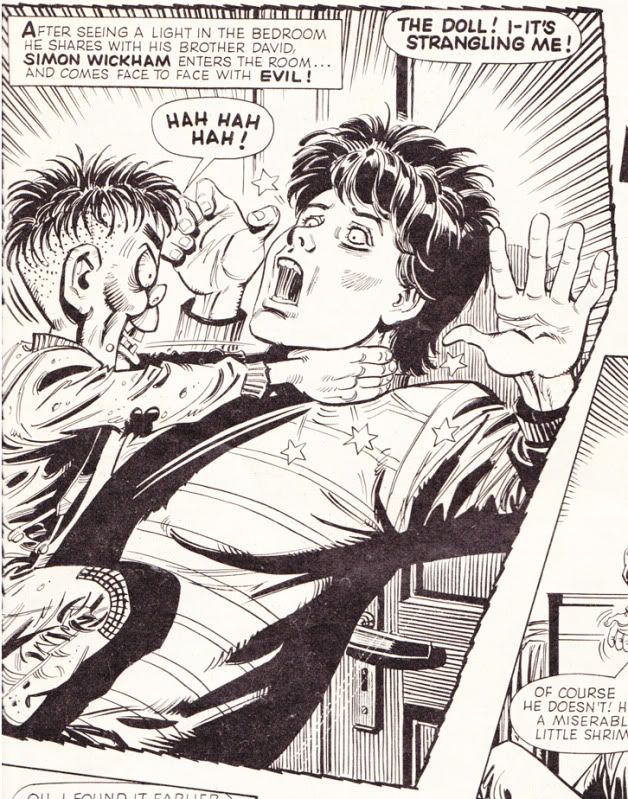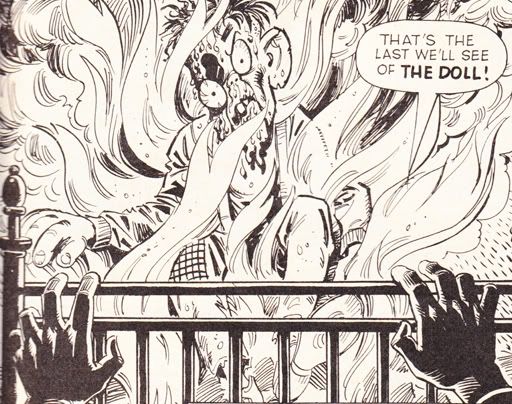When I was at school in Australia, I read pretty much the only poem I've ever 100% loved. But, all I could ever remember about it is the line "The kraken has awakened". And I remember this line because my friends and I used to pronounce it as "the cracken has awackened" - this was one of the funniest things in the world to our ten-year-old sensibilities. I also remember doodling, in red ink, a kraken attacking a ship at the top of my lined A4 piece of paper, right next to the title 'The Kraken'.
Now, thanks to the wonder of the information superhighway, I've found the actual text:
THE KRAKEN
Jack Prelutsky
Deep beneath the foaming billows
Something suddenly amiss,
As a creature wakes from slumber
In the bottomless abyss.
And a panic fills the ocean,
Every fish and frenzied flea,
For the Kraken has awakened at the bottom of the seas.
It rises to the surface
With an overwhelming noise,
And it hunts for mighty vessels
Which it crushes and destroys.
Then it chokes a great leviathan
With one stupendous squeeze!
Oh, the Kraken has awakened at the bottom of the seas.
How it lashes, how it thrashes,
How it flashes, how it flails,
How it dwarfs the greatest fishes,
Even dwarfs the mighty Wales.
Nothing living in the ocean
Can enjoy a moment’s ease,
For the Kraken has awakened at the bottom of the seas.
In searching for this poem, I also found the same-titled poem by Tennyson:
THE KRAKEN
Lord Alfred Tennyson
Below the thunders of the upper deep;
Far, far beneath in the abysmal sea,
His antient, dreamless, uninvaded sleep
The Kraken sleepeth: faintest sunlights flee
About his shadowy sides: above him swell
Huge sponges of millennial growth and height;
And far away into the sickly light,
From many a wondrous grot and secret cell
Unnumber'd and enormous polypi
Winnow with giant arms the slumbering green.
There hath he lain for ages and will lie
Battening upon huge seaworms in his sleep,
Until the latter fire shall heat the deep;
Then once by man and angels to be seen,
In roaring he shall rise and on the surface die.
I like this one too, although not quite as much. I think the first poem (which is from 1976) has more power, but the second (which is from 1830) has more atmosphere. With Prelutsky's, I can clearly picture a creature, a beast, so monumentally huge that even "a great leviathan" (itself supposedly the largest creature on the planet) can be destroyed by it. Just how big IS his 'Kraken'?! That sounds smutty. Heehehe!
Ahem.
Tennyson's, on the other hand, is of a size so large it's part of the very ocean bed, perhaps (STOP IT!). There is also something Lovecraftian about his Kraken, even if this might be an obvious observation ;)
Both poems have filtered into a piece I initially started writing as a mad last-minute dash to answer this impending sub call but is looking more like it's not going to be finished in time. Plus, even though 'war' is a theme in it, I'm not entirely convinced it will actually involve war...although the implications of what the main character discovers will certainly suggest that something terrible is on the horizon and getting closer with every passing day.
I have titled the story THE THIRD WAVE. I was aware this phrase had Nazi connotations, though I wasn't sure why or how. So I found this interesting article and had a good ol' read. This particular bit struck me as especially coincidental:
As his Strength Through Community lecture ended, he created a class salute by bringing his right hand toward his right shoulder in an outwardly curled position, resembling a wave. Jones named it the Third Wave, and - despite its similarity to Third Reich - claims he borrowed the term from beach folklore, which holds that the last wave in every series of three is the largest.
I'm not going to go into any more detail about this just yet, but I did wonder if it's "right" to name a story after something that, technically, doesn't come into use until after the events of the story - even if the story doesn't directly reference the phrase...ie 'the third wave' came about in the Sixties, and my story's set in the late Forties and makes mention of the Nazis, but has more in common with that bolded line above then the actual experiment. Maybe it doesn't matter? I'm not sure.
What I will say is that, perhaps as obviously as the Tennyson/Lovecraft 'link', the Bible has some solid gold lines in it for inspiration. In particular, the sections about Leviathan and Behemoth, two gigantic and formidable creatures. Particularly Job 40:15 to 41:34:
15 “Look at Behemoth,
which I made along with you
and which feeds on grass like an ox.
16 What strength it has in its loins,
what power in the muscles of its belly!
17 Its tail sways like a cedar;
the sinews of its thighs are close-knit.
18 Its bones are tubes of bronze,
its limbs like rods of iron.
19 It ranks first among the works of God,
yet its Maker can approach it with his sword.
20 The hills bring it their produce,
and all the wild animals play nearby.
21 Under the lotus plants it lies,
hidden among the reeds in the marsh.
22 The lotuses conceal it in their shadow;
the poplars by the stream surround it.
23 A raging river does not alarm it;
it is secure, though the Jordan should surge against its mouth.
24 Can anyone capture it by the eyes,
or trap it and pierce its nose?
Job 41
1 “Can you pull in Leviathan with a fishhook
or tie down its tongue with a rope?
2 Can you put a cord through its nose
or pierce its jaw with a hook?
3 Will it keep begging you for mercy?
Will it speak to you with gentle words?
4 Will it make an agreement with you
for you to take it as your slave for life?
5 Can you make a pet of it like a bird
or put it on a leash for the young women in your house?
6 Will traders barter for it?
Will they divide it up among the merchants?
7 Can you fill its hide with harpoons
or its head with fishing spears?
8 If you lay a hand on it,
you will remember the struggle and never do it again!
9 Any hope of subduing it is false;
the mere sight of it is overpowering.
10 No one is fierce enough to rouse it.
Who then is able to stand against me?
11 Who has a claim against me that I must pay?
Everything under heaven belongs to me.
12 “I will not fail to speak of Leviathan’s limbs,
its strength and its graceful form.
13 Who can strip off its outer coat?
Who can penetrate its double coat of armor?
14 Who dares open the doors of its mouth,
ringed about with fearsome teeth?
15 Its back has rows of shields
tightly sealed together;
16 each is so close to the next
that no air can pass between.
17 They are joined fast to one another;
they cling together and cannot be parted.
18 Its snorting throws out flashes of light;
its eyes are like the rays of dawn.
19 Flames stream from its mouth;
sparks of fire shoot out.
20 Smoke pours from its nostrils
as from a boiling pot over burning reeds.
21 Its breath sets coals ablaze,
and flames dart from its mouth.
22 Strength resides in its neck;
dismay goes before it.
23 The folds of its flesh are tightly joined;
they are firm and immovable.
24 Its chest is hard as rock,
hard as a lower millstone.
25 When it rises up, the mighty are terrified;
they retreat before its thrashing.
26 The sword that reaches it has no effect,
nor does the spear or the dart or the javelin.
27 Iron it treats like straw
and bronze like rotten wood.
28 Arrows do not make it flee;
slingstones are like chaff to it.
29 A club seems to it but a piece of straw;
it laughs at the rattling of the lance.
30 Its undersides are jagged potsherds,
leaving a trail in the mud like a threshing sledge.
31 It makes the depths churn like a boiling caldron
and stirs up the sea like a pot of ointment.
32 It leaves a glistening wake behind it;
one would think the deep had white hair.
33 Nothing on earth is its equal—
a creature without fear.
34 It looks down on all that are haughty;
it is king over all that are proud.”




